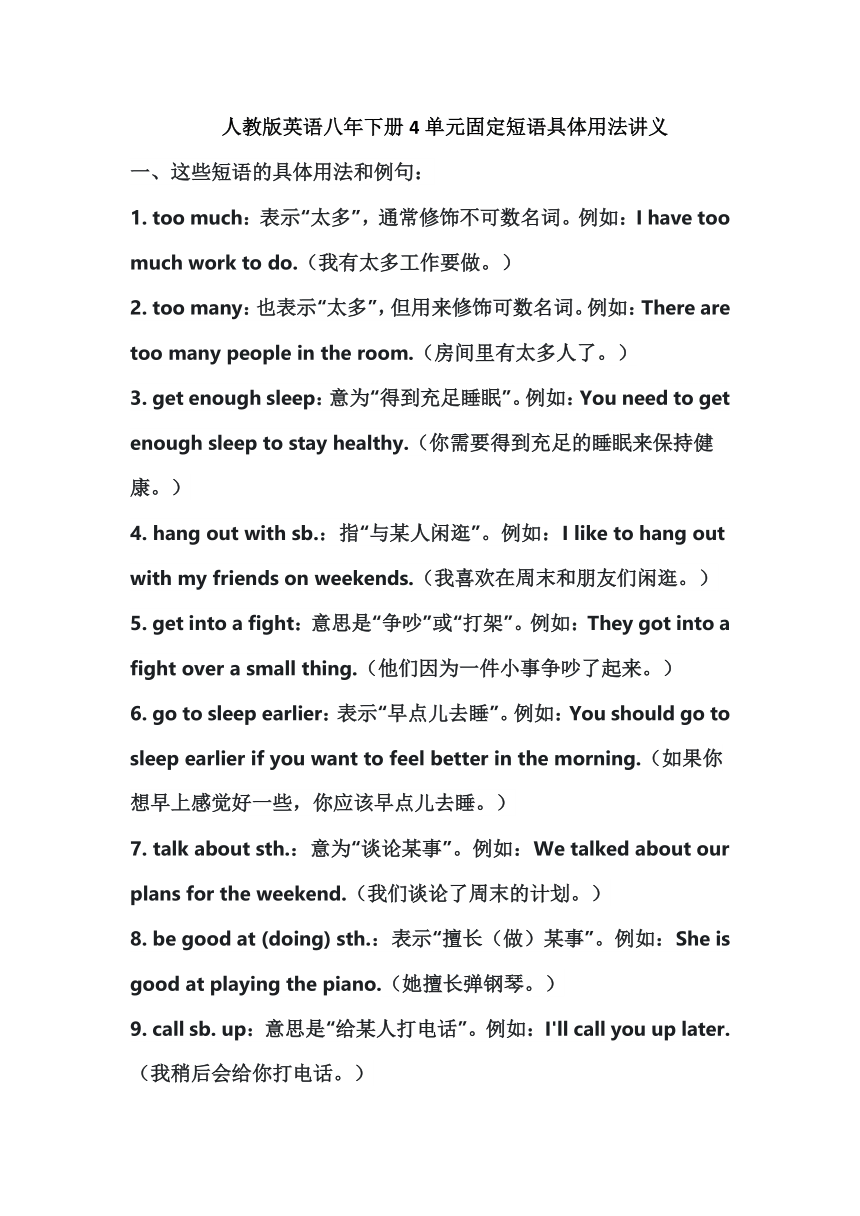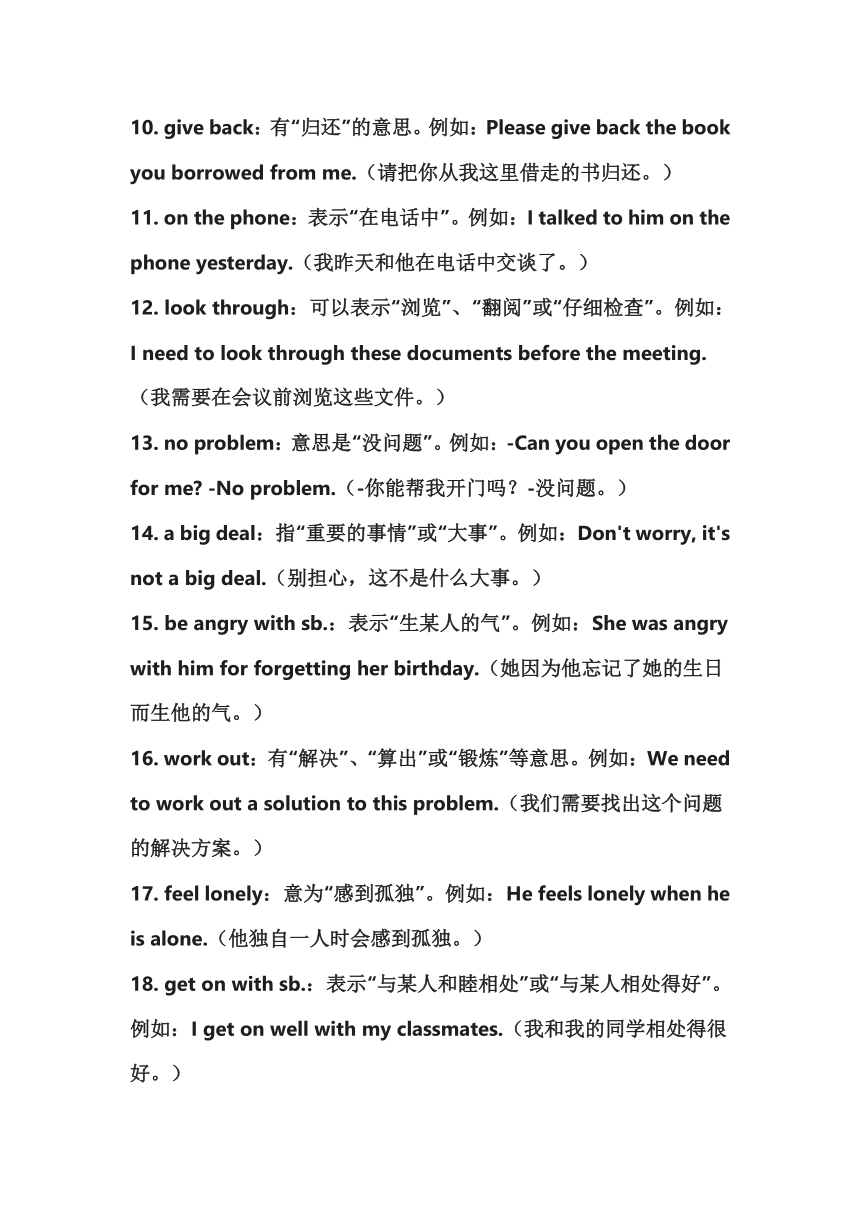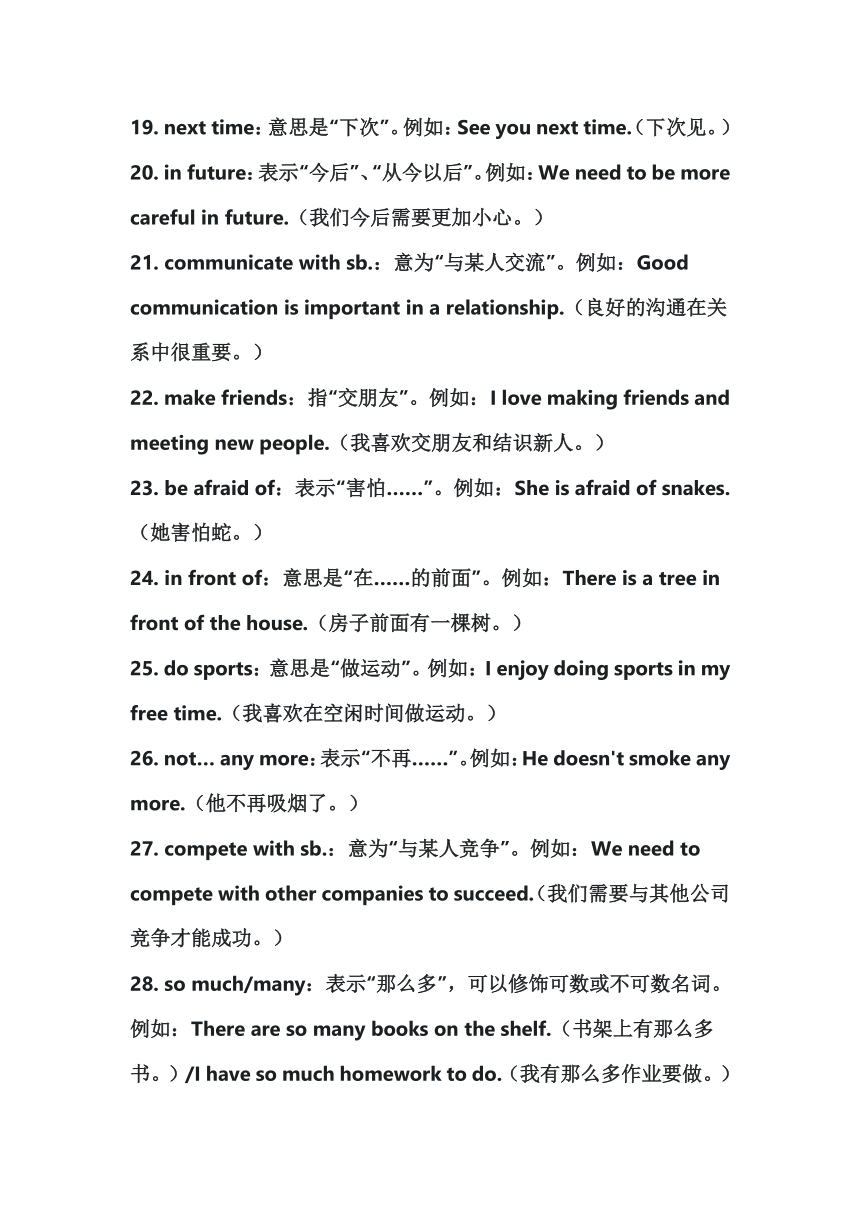Unit 4 Why don't you talk to your parents?单元固定短语具体用法讲义
文档属性
| 名称 | Unit 4 Why don't you talk to your parents?单元固定短语具体用法讲义 |  | |
| 格式 | docx | ||
| 文件大小 | 20.6KB | ||
| 资源类型 | 教案 | ||
| 版本资源 | 人教新目标(Go for it)版 | ||
| 科目 | 英语 | ||
| 更新时间 | 2024-02-07 19:13:41 | ||
图片预览



文档简介
人教版英语八年下册4单元固定短语具体用法讲义
一、这些短语的具体用法和例句:
1. too much:表示“太多”,通常修饰不可数名词。例如:I have too much work to do.(我有太多工作要做。)
2. too many:也表示“太多”,但用来修饰可数名词。例如:There are too many people in the room.(房间里有太多人了。)
3. get enough sleep:意为“得到充足睡眠”。例如:You need to get enough sleep to stay healthy.(你需要得到充足的睡眠来保持健康。)
4. hang out with sb.:指“与某人闲逛”。例如:I like to hang out with my friends on weekends.(我喜欢在周末和朋友们闲逛。)
5. get into a fight:意思是“争吵”或“打架”。例如:They got into a fight over a small thing.(他们因为一件小事争吵了起来。)
6. go to sleep earlier:表示“早点儿去睡”。例如:You should go to sleep earlier if you want to feel better in the morning.(如果你想早上感觉好一些,你应该早点儿去睡。)
7. talk about sth.:意为“谈论某事”。例如:We talked about our plans for the weekend.(我们谈论了周末的计划。)
8. be good at (doing) sth.:表示“擅长(做)某事”。例如:She is good at playing the piano.(她擅长弹钢琴。)
9. call sb. up:意思是“给某人打电话”。例如:I'll call you up later.(我稍后会给你打电话。)
10. give back:有“归还”的意思。例如:Please give back the book you borrowed from me.(请把你从我这里借走的书归还。)
11. on the phone:表示“在电话中”。例如:I talked to him on the phone yesterday.(我昨天和他在电话中交谈了。)
12. look through:可以表示“浏览”、“翻阅”或“仔细检查”。例如:I need to look through these documents before the meeting.(我需要在会议前浏览这些文件。)
13. no problem:意思是“没问题”。例如:-Can you open the door for me -No problem.(-你能帮我开门吗?-没问题。)
14. a big deal:指“重要的事情”或“大事”。例如:Don't worry, it's not a big deal.(别担心,这不是什么大事。)
15. be angry with sb.:表示“生某人的气”。例如:She was angry with him for forgetting her birthday.(她因为他忘记了她的生日而生他的气。)
16. work out:有“解决”、“算出”或“锻炼”等意思。例如:We need to work out a solution to this problem.(我们需要找出这个问题的解决方案。)
17. feel lonely:意为“感到孤独”。例如:He feels lonely when he is alone.(他独自一人时会感到孤独。)
18. get on with sb.:表示“与某人和睦相处”或“与某人相处得好”。例如:I get on well with my classmates.(我和我的同学相处得很好。)
19. next time:意思是“下次”。例如:See you next time.(下次见。)
20. in future:表示“今后”、“从今以后”。例如:We need to be more careful in future.(我们今后需要更加小心。)
21. communicate with sb.:意为“与某人交流”。例如:Good communication is important in a relationship.(良好的沟通在关系中很重要。)
22. make friends:指“交朋友”。例如:I love making friends and meeting new people.(我喜欢交朋友和结识新人。)
23. be afraid of:表示“害怕……”。例如:She is afraid of snakes.(她害怕蛇。)
24. in front of:意思是“在……的前面”。例如:There is a tree in front of the house.(房子前面有一棵树。)
25. do sports:意思是“做运动”。例如:I enjoy doing sports in my free time.(我喜欢在空闲时间做运动。)
26. not… any more:表示“不再……”。例如:He doesn't smoke any more.(他不再吸烟了。)
pete with sb.:意为“与某人竞争”。例如:We need to compete with other companies to succeed.(我们需要与其他公司竞争才能成功。)
28. so much/many:表示“那么多”,可以修饰可数或不可数名词。例如:There are so many books on the shelf.(书架上有那么多书。)/I have so much homework to do.(我有那么多作业要做。)
29. have lessons:表示“上课”。例如:We have English lessons every day.(我们每天上英语课。)
30. go shopping:意思是“去购物”。例如:I usually go shopping on Sundays.(我通常在星期天去购物。)
31. cut out:可以表示“删除”、“删去”或“切掉”等。例如:Please cut out this part of the paper.(请把这张纸的这一部分切掉。)
32. all kinds of:意为“各种各样的”。例如:There are all kinds of flowers in the garden.(花园里有各种各样的花。)
pare… with…:指“比较……与……”。例如:We compared the prices of different products.(我们比较了不同产品的价格。)
34. a few:表示“几个”、“一些”,用来修饰可数名词。例如:I have a few friends in the city.(我在这个城市有几个朋友。)
35. agree with sb.:意思是“同意某人”。例如:I agree with you on this point.(在这一点上我同意你的看法。)
36. in one’s opinion:表示“在某人看来”或“依……看”。例如:In my opinion, this is the best option.(在我看来,这是最好的选择。)
37. turn down:有“调小”、“拒绝”等意思。例如:Please turn down the volume.(请把音量调小。)/He turned down the job offer.(他拒绝了那份工作邀请。)
38. something quiet:表示“一些安静的事”。例如:I need something quiet to relax.(我需要一些安静的事情来放松。)
二、练习题和详细讲解:
1. There is ___ water on the floor. Be careful!
A. too much B. too many C. much too
解析:water 是不可数名词,“太多”用 too much,故选 A。
2. I have ___ homework to do today.
A. too much B. too many C. much too
解析:homework 是不可数名词,“太多”用 too much,故选 A。
3. You should ___ enough sleep to stay healthy.
A. get B. to get C. getting
解析:should 是情态动词,后接动词原形,故选 A。
4. I like to ___ my friends on weekends.
A. hang out with B. hung out with C. hanging out with
解析:like to do sth. 喜欢做某事,故选 A。
5. They often ___ about small things.
A. talk B. talks C. talking
解析:often 表明是一般现在时,they 作主语,谓语用原形,故选 A。
6. You need to ___ earlier if you want to be healthy.
A. go to sleep B. goes to sleep C. going to sleep
解析:need to do sth. 需要做某事,故选 A。
7. Can you ___ your English teacher
A. call up B. called up C. calling up
解析:can 是情态动词,后接动词原形,故选 A。
8. You should ___ the book to the library on time.
A. give back B. gave back C. giving back
解析:should 是情态动词,后接动词原形,故选 A。
9. I am good at ___ English.
A. speak B. speaking C. to speak
解析:be good at doing sth. 擅长做某事,故选 B。
10. I had a fight with my best friend. I am ___ with him now.
A. angry B. happy C. nice
解析:根据“had a fight”可知“我”现在生他的气,be angry with sb. 生某人的气,故选 A。
11. If you have a problem, you can ___ it.
A. work out B. look through C. go over
解析:work out 解决;look through 浏览;go over 复习。根据句意“如果你有问题,你可以解决它”,故选 A。
12. Don't ___ the newspaper before the exam.
A. look through B. read C. see
解析:look through 表示“仔细检查、浏览”,符合句意“考试前不要翻阅报纸”,故选 A。
13. —Is it a big deal —No, it's ___ .
A. not a big deal B. a small deal C. no problem
解析:no problem 表示“没问题”,用于回答别人的请求或道歉等,符合语境,故选 C。
14. I feel very ___ when my parents are out.
A. lonely B. happy C. excited
解析:父母不在家时会感到“孤独”,lonely 孤独的,故选 A。
15. We should communicate ___ our parents more.
A. with B. to C. for
解析:communicate with sb. 与某人交流,故选 A。
一、这些短语的具体用法和例句:
1. too much:表示“太多”,通常修饰不可数名词。例如:I have too much work to do.(我有太多工作要做。)
2. too many:也表示“太多”,但用来修饰可数名词。例如:There are too many people in the room.(房间里有太多人了。)
3. get enough sleep:意为“得到充足睡眠”。例如:You need to get enough sleep to stay healthy.(你需要得到充足的睡眠来保持健康。)
4. hang out with sb.:指“与某人闲逛”。例如:I like to hang out with my friends on weekends.(我喜欢在周末和朋友们闲逛。)
5. get into a fight:意思是“争吵”或“打架”。例如:They got into a fight over a small thing.(他们因为一件小事争吵了起来。)
6. go to sleep earlier:表示“早点儿去睡”。例如:You should go to sleep earlier if you want to feel better in the morning.(如果你想早上感觉好一些,你应该早点儿去睡。)
7. talk about sth.:意为“谈论某事”。例如:We talked about our plans for the weekend.(我们谈论了周末的计划。)
8. be good at (doing) sth.:表示“擅长(做)某事”。例如:She is good at playing the piano.(她擅长弹钢琴。)
9. call sb. up:意思是“给某人打电话”。例如:I'll call you up later.(我稍后会给你打电话。)
10. give back:有“归还”的意思。例如:Please give back the book you borrowed from me.(请把你从我这里借走的书归还。)
11. on the phone:表示“在电话中”。例如:I talked to him on the phone yesterday.(我昨天和他在电话中交谈了。)
12. look through:可以表示“浏览”、“翻阅”或“仔细检查”。例如:I need to look through these documents before the meeting.(我需要在会议前浏览这些文件。)
13. no problem:意思是“没问题”。例如:-Can you open the door for me -No problem.(-你能帮我开门吗?-没问题。)
14. a big deal:指“重要的事情”或“大事”。例如:Don't worry, it's not a big deal.(别担心,这不是什么大事。)
15. be angry with sb.:表示“生某人的气”。例如:She was angry with him for forgetting her birthday.(她因为他忘记了她的生日而生他的气。)
16. work out:有“解决”、“算出”或“锻炼”等意思。例如:We need to work out a solution to this problem.(我们需要找出这个问题的解决方案。)
17. feel lonely:意为“感到孤独”。例如:He feels lonely when he is alone.(他独自一人时会感到孤独。)
18. get on with sb.:表示“与某人和睦相处”或“与某人相处得好”。例如:I get on well with my classmates.(我和我的同学相处得很好。)
19. next time:意思是“下次”。例如:See you next time.(下次见。)
20. in future:表示“今后”、“从今以后”。例如:We need to be more careful in future.(我们今后需要更加小心。)
21. communicate with sb.:意为“与某人交流”。例如:Good communication is important in a relationship.(良好的沟通在关系中很重要。)
22. make friends:指“交朋友”。例如:I love making friends and meeting new people.(我喜欢交朋友和结识新人。)
23. be afraid of:表示“害怕……”。例如:She is afraid of snakes.(她害怕蛇。)
24. in front of:意思是“在……的前面”。例如:There is a tree in front of the house.(房子前面有一棵树。)
25. do sports:意思是“做运动”。例如:I enjoy doing sports in my free time.(我喜欢在空闲时间做运动。)
26. not… any more:表示“不再……”。例如:He doesn't smoke any more.(他不再吸烟了。)
pete with sb.:意为“与某人竞争”。例如:We need to compete with other companies to succeed.(我们需要与其他公司竞争才能成功。)
28. so much/many:表示“那么多”,可以修饰可数或不可数名词。例如:There are so many books on the shelf.(书架上有那么多书。)/I have so much homework to do.(我有那么多作业要做。)
29. have lessons:表示“上课”。例如:We have English lessons every day.(我们每天上英语课。)
30. go shopping:意思是“去购物”。例如:I usually go shopping on Sundays.(我通常在星期天去购物。)
31. cut out:可以表示“删除”、“删去”或“切掉”等。例如:Please cut out this part of the paper.(请把这张纸的这一部分切掉。)
32. all kinds of:意为“各种各样的”。例如:There are all kinds of flowers in the garden.(花园里有各种各样的花。)
pare… with…:指“比较……与……”。例如:We compared the prices of different products.(我们比较了不同产品的价格。)
34. a few:表示“几个”、“一些”,用来修饰可数名词。例如:I have a few friends in the city.(我在这个城市有几个朋友。)
35. agree with sb.:意思是“同意某人”。例如:I agree with you on this point.(在这一点上我同意你的看法。)
36. in one’s opinion:表示“在某人看来”或“依……看”。例如:In my opinion, this is the best option.(在我看来,这是最好的选择。)
37. turn down:有“调小”、“拒绝”等意思。例如:Please turn down the volume.(请把音量调小。)/He turned down the job offer.(他拒绝了那份工作邀请。)
38. something quiet:表示“一些安静的事”。例如:I need something quiet to relax.(我需要一些安静的事情来放松。)
二、练习题和详细讲解:
1. There is ___ water on the floor. Be careful!
A. too much B. too many C. much too
解析:water 是不可数名词,“太多”用 too much,故选 A。
2. I have ___ homework to do today.
A. too much B. too many C. much too
解析:homework 是不可数名词,“太多”用 too much,故选 A。
3. You should ___ enough sleep to stay healthy.
A. get B. to get C. getting
解析:should 是情态动词,后接动词原形,故选 A。
4. I like to ___ my friends on weekends.
A. hang out with B. hung out with C. hanging out with
解析:like to do sth. 喜欢做某事,故选 A。
5. They often ___ about small things.
A. talk B. talks C. talking
解析:often 表明是一般现在时,they 作主语,谓语用原形,故选 A。
6. You need to ___ earlier if you want to be healthy.
A. go to sleep B. goes to sleep C. going to sleep
解析:need to do sth. 需要做某事,故选 A。
7. Can you ___ your English teacher
A. call up B. called up C. calling up
解析:can 是情态动词,后接动词原形,故选 A。
8. You should ___ the book to the library on time.
A. give back B. gave back C. giving back
解析:should 是情态动词,后接动词原形,故选 A。
9. I am good at ___ English.
A. speak B. speaking C. to speak
解析:be good at doing sth. 擅长做某事,故选 B。
10. I had a fight with my best friend. I am ___ with him now.
A. angry B. happy C. nice
解析:根据“had a fight”可知“我”现在生他的气,be angry with sb. 生某人的气,故选 A。
11. If you have a problem, you can ___ it.
A. work out B. look through C. go over
解析:work out 解决;look through 浏览;go over 复习。根据句意“如果你有问题,你可以解决它”,故选 A。
12. Don't ___ the newspaper before the exam.
A. look through B. read C. see
解析:look through 表示“仔细检查、浏览”,符合句意“考试前不要翻阅报纸”,故选 A。
13. —Is it a big deal —No, it's ___ .
A. not a big deal B. a small deal C. no problem
解析:no problem 表示“没问题”,用于回答别人的请求或道歉等,符合语境,故选 C。
14. I feel very ___ when my parents are out.
A. lonely B. happy C. excited
解析:父母不在家时会感到“孤独”,lonely 孤独的,故选 A。
15. We should communicate ___ our parents more.
A. with B. to C. for
解析:communicate with sb. 与某人交流,故选 A。
同课章节目录
- Unit 1 What's the matter?
- Section A
- Section B
- Unit 2 I'll help to clean up the city parks.
- Section A
- Section B
- Unit 3 Could you please clean your room?
- Section A
- Section B
- Unit 4 Why don't you talk to your parents?
- Section A
- Section B
- Unit 5 What were you doing when the rainstorm came
- Section A
- Section B
- Review of Units 1-5
- Unit 6 An old man tried to move the mountains.
- Section A
- Section B
- Unit 7 What's the highest mountain in the world?
- Section A
- Section B
- Unit 8 Have you read Treasure Island yet?
- Section A
- Section B
- Unit 9 Have you ever been to a museum?
- Section A
- Section B
- Unit 10 I've had this bike for three years.
- Section A
- Section B
